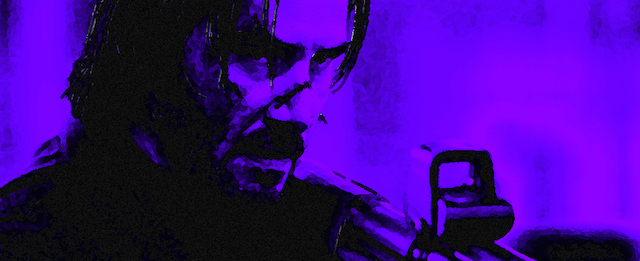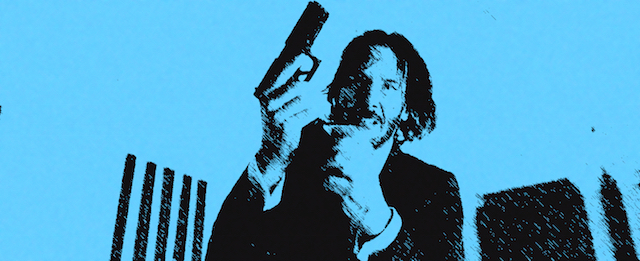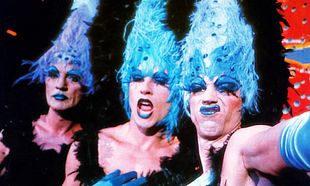'John Wick' and 'John Wick: Chapter 2' are part of one of the few movie franchises in this site's twenty-one year history where both the original and the sequel received perfect scores.
Some people thought we were doing ironically, but the fact remains that 'John Wick' represents a honed simplicity and strength of focus that's been sorely lacking from action cinema for years. As much as people may enjoy the likes of 'Black Panther', 'Captain America: Civil War' or 'Avengers: Infinity War', they come with baggage. Lots of baggage.
For one, there are pre-existing characters that need to adhere to their previous iterations, or explain themselves if/when they deviate from them. Not only that, their origin stories characters have been determined long ago. Some might have some kind of emotional heft, but screenwriters are constricted by their need to adhere to them.
You've also got to contend with the fact that these characters are very often paragons of virtue. Captain America's square-jawed heroism, Tony Stark's techno-idealism, The Hulk's restrained but virtuous power, Batman's need for absolute justice - there are very few shades of grey in them because they're birthed from comics where absolutes are key.
When these characters were first splashed across the pages, simplicity was the key - you had to know who the villains were and who the good guys (and precious few girls) were in order to follow the static action. Pushing them on and on meant that, eventually, there'd be retcons, references, reimaginations and reinterpretations - not to mention a tapestry of interweaving storylines, all needing an encyclopedic knowledge to understand.
'John Wick', meanwhile, takes some cues from comics but because it's not from them, it doesn't need to adhere to anything that's not pushing the story forward.

That's really what 'John Wick' has over just about every action movie of the past decade or so - a cleanliness of purpose. The reason for his violence is made decidedly clear in the first act of the first movie, and it's one people can immediately understand. There might be some fridging of his wife, but it's not done in a gruesome way or one that drives him to seek vengeance.
Instead, what 'John Wick' sets up and explores further in 'John Wick: Chapter 2' is that the character was just looking for an excuse to get nasty. That's the simple truth of the character - that he just needed a reason to start shooting, and having his car stolen and his dog murdered was all he needed. It's all there, on the screen, with no need for a backstory or a tie-in novel or comic book to explain it.
Keanu Reeves' performance seems to suggest that he understands this need for simplicity. He doesn't use fifteen pages of dialogue when one or two lines will do the job. It's the same with the action sequences as well. They might be flashy and well-directed, but they all make sense because they're designed to push the character through the scene in the most efficient way possible.
The movie is simply about John Wick surviving the night in New York and trying to escape. The poster for 'John Wick: Chapter 3 - Parabellum' shows a crowd of killers moving towards him, with their shadows casting the lines of a city. It's a wider canvass to work with, but the focus is the same - get the character from A to B to C, and make it look good.

In an interview with /Film, screenwriter Derek Kolstad echoed these sentiments. "Paragraphs of his dialogue became 'uh-huh,' or a look. What we loved about the character of John Wick is he walks into a room, and there’s this unspoken notion of volumes of dialogue."
"I think the screenplay for ('John Wick: Chapter 2') was 86 pages, which is on par with 'The Raid', and the reason being is it allows Chad and Keanu, the DP, and the editor to shine. From a writer’s standpoint, you gotta look at the setting and the look as the dialogue."
That point is key to understanding what makes 'John Wick' so effective. Dialogue is almost secondary, and what you're left with is what's known as 'pure cinema'. Pure cinema, if you never studied film in college or read the Wikipedia article, is the idea that movies are at their most pure when it just about movement, rhythm and visuals. 'Dunkirk' is considered a good example of it, as the movie has barely any dialogue. 'John Wick' and 'John Wick: Chapter 2' work in a similar fashion.
The ultimate in sophistication is simplicity, something that just looks good, moves good and is good. Calling 'John Wick' and 'John Wick: Chapter 2' simplistic in their approach isn't a criticism, it's a compliment. In a world where movies have be tied to each other and where audiences seem to clamour for expanded cinematic universes, 'John Wick' and 'John Wick: Chapter 2' make a case for elegant simplicity.
If you saw the first one, you've seen everything there is you'd need to know the enjoy the second one. The same goes for the third.










































































